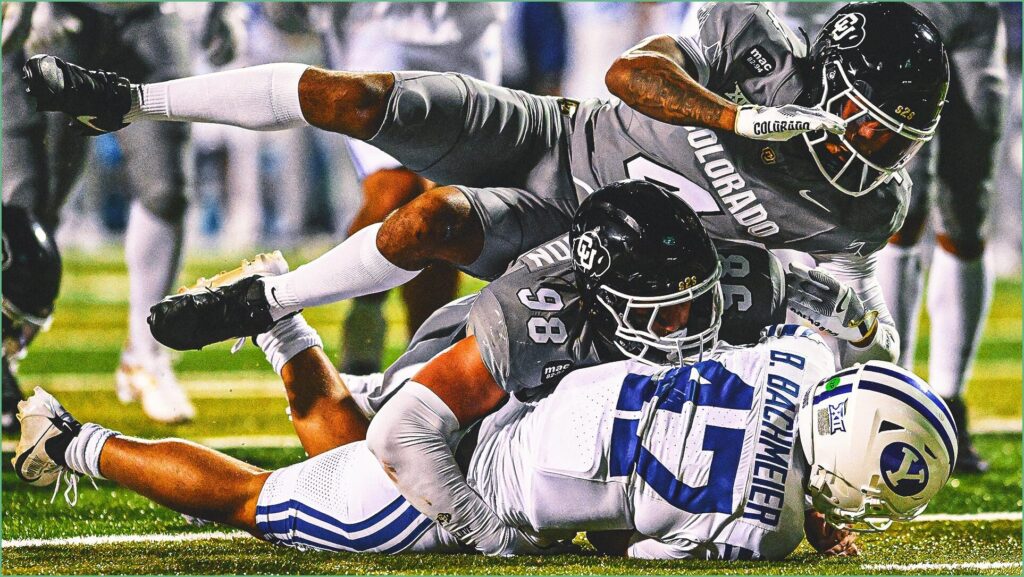Colorado coach Deion Sanders apologized to BYU after derogatory chants by Buffaloes fans during a game over the weekend resulted in a fine for the program. The incident has pushed questions about fan behavior, leadership responsibility, and how college teams manage public conduct. The apology landed with immediate scrutiny from supporters, critics, and the broader college football community.
At a recent matchup, a section of Colorado supporters directed chants at BYU that crossed a line into clearly disrespectful territory. That behavior prompted conference or school officials to levy a fine against the Colorado program, signaling that stadium conduct carries real consequences. Beyond the financial hit, the episode dents a program’s reputation and distracts from the work coaches and players are trying to do on the field.
Sanders stepped into a difficult role when he issued a public apology, acknowledging the harm caused by the chants and taking some responsibility for the environment around his team. The moment underscores a simple fact: leaders are judged not only by wins but by the culture they build. In college athletics, the coach’s voice matters, and apologies can be a starting point for real change or a brief PR move, depending on follow-through.
Fans show passion, and passion can be productive or destructive depending on where it lands. When it tips into personal attacks or derogatory language, it creates an environment that alienates opponents and distracts from competition. Universities and conferences have rules to prevent that, and when those rules are broken, enforcement becomes inevitable.
The fine itself is a blunt instrument: it punishes the program financially and signals that certain behaviors will not be tolerated. But money alone rarely fixes culture problems, which require a sustained effort from leadership, staff, and fan bases. The real test will be whether Colorado’s athletic department turns this moment into a comprehensive plan to educate and hold people accountable.
Apologies are meaningful when paired with action, and Sanders’ statement opens a window for tangible steps. Those could include targeted fan education campaigns, stricter stadium enforcement, or clear policies about who is allowed in certain areas. The aim should be to preserve spirited support without allowing harassment or demeaning language to become normalized.
Reputation risk is not abstract for college programs; it affects recruiting, alumni relations, and donor support. Prospective players and their families are watching how institutions respond to incidents of misconduct, and they make judgments about character as well as competitiveness. A swift, sincere apology followed by concrete measures can blunt long-term fallout and restore trust among stakeholders.
Opponents like BYU also endure immediate effects, with players and coaches forced to address off-field drama amid game preparation. That disruption can be emotional and tactical, and it deserves recognition in any discussion of consequences. Respect for visiting teams is a small but essential part of preserving the integrity of college sports.
College campuses are learning environments, and incidents like this provide opportunities for education on respect and civility. Athletic events are public spectacles, and institutions must balance free expression with protections against harassment. Thoughtful programming can turn a negative episode into a teaching moment that strengthens community standards.
Security and stadium staff play a direct role in preventing and addressing harmful chants, and their protocols will likely face review. Clear guidelines for intervention and escalation can reduce the likelihood that chants become chants that cross ethical lines. Training ushers, security, and event staff to recognize and stop degrading behavior early is a practical step many institutions consider after such incidents.
Social media fuels rapid public reaction, amplifying outrages and apologies alike, and that dynamic pressures universities to act quickly. The court of public opinion moves fast, and institutions often respond in real time to limit reputational damage. Yet fast responses must still be thoughtful, or they risk appearing performative rather than substantive.
Long-term change depends on measuring outcomes and being transparent about progress, not just issuing one-time statements. Publicly reporting on fan conduct initiatives, disciplinary outcomes, and preventive measures helps rebuild trust and demonstrates accountability. Transparency turns an apology into a promise that can be evaluated over time.
Student sections and booster groups are central to a program’s atmosphere, and engaging those constituencies directly can be the most effective path to reform. Conversations led by student leaders, supported by coaches and administrators, help reshape norms from the inside out. When fans buy into a culture of respect, enforcement becomes a shared responsibility rather than top-down coercion.
Alumni and donors also influence how institutions respond, and their pressure can push administrations toward firmer measures. They often want their investments associated with positive values as much as athletic success. Engaging alumni in solutions can provide both moral support and practical resources for sustained change.
